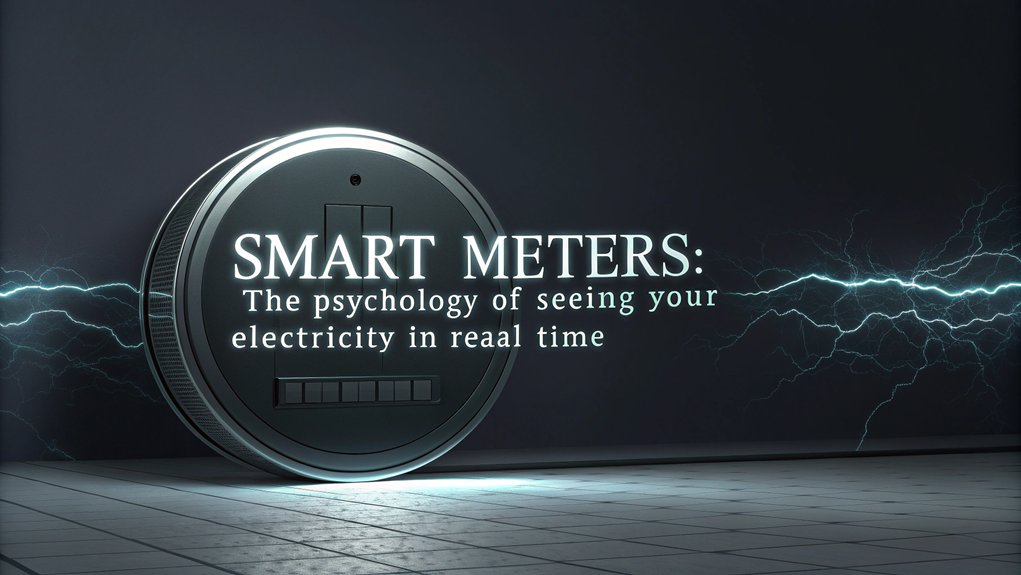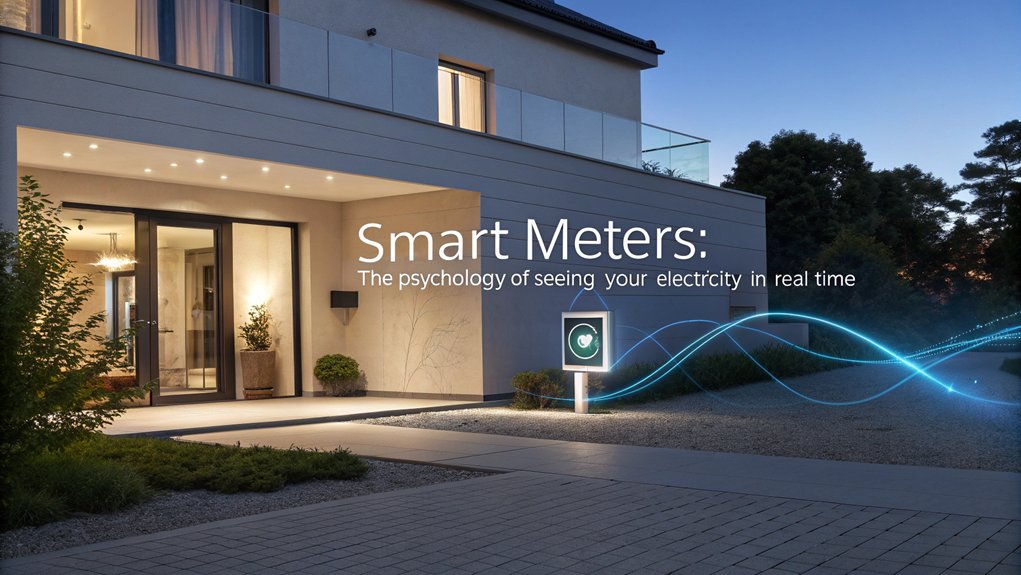Seeing your electricity in real time with smart meters is like switching on a light bulb in a dark room. It reveals your consumption patterns and nudges you to adjust habits, reducing energy use by an average of 7%. This immediate feedback engages your behavior, helping you to identify and manage high-energy devices more effectively. You’ll find yourself making conscious, energy-saving decisions more often. Continue to see how you can leverage more insights for efficiency.
Key Facts Summarized
- Real-time data from smart meters fosters situational awareness, leading to conscious energy-saving decisions.
- Behavioral nudges through immediate consumption feedback inspire users to adjust electricity habits and reduce waste.
- In-home displays enhance engagement by visually representing energy usage, cost, and savings opportunities.
- Users typically reduce energy consumption by an average of 7% when informed by real-time data.
- Device-specific feedback enables optimized management of high-energy devices, encouraging efficient energy use.
Understanding the Role of Smart Meters
Smart meters have revolutionized the way we comprehend electricity consumption by providing real-time data that traditional meters simply can’t match.
With the ability to track energy usage every few minutes, you gain unparalleled insight into how and when you consume electricity. This real-time information empowers you to take control of your energy consumption, identifying patterns and opportunities for energy savings.
Studies reveal that informed users typically achieve a 4% to 12% reduction in energy use. By integrating smart meters with other smart devices, such as thermostats, you can enhance these savings to 10% or even 15%.
This technology not only promotes energy efficiency but also encourages proactive behavior, as 80% of users adjust their habits after receiving feedback. Additionally, whole-home energy monitors can further enhance your understanding of energy usage by pinpointing high-energy devices and optimizing consumption.
The Impact of Real-Time Feedback on Energy Consumption
When you receive real-time feedback from smart meters, it dramatically impacts how you consume electricity. This immediate insight into your energy consumption encourages you to modify usage patterns, resulting in an average reduction of 7%.
By engaging with smart meter data, you become more aware of the financial implications of your energy behavior, leading to more conscious decisions. With 80% of users actively adjusting their habits, the link between feedback and behavior change is evident.
In-home displays (IHDs) effectively drive these changes, surpassing static information methods. They empower you to target major appliances, fostering sustainable habits.
As you visualize the direct connection between consumption and cost, real-time feedback becomes a powerful tool in promoting lasting energy-saving actions. Additionally, the integration of renewable energy sources provides valuable insights that further enhance your energy management efforts.
Behavioral Psychology and Energy Usage
Smart meter technology provides real-time monitoring, which engages you by offering immediate data on your energy consumption. This visibility acts as a powerful behavioral nudge, encouraging you to make conscious choices—like turning off unused appliances or investing in energy-efficient technology. With this approach, you can see an average reduction of 7% in your energy use, with some achieving over 20%. Unlike static information leaflets, which are easily ignored, real-time feedback fosters situational awareness, prompting you to adapt your habits. This awareness reduces waste, such as the £30 a year lost to standby appliances, and heightens your understanding of environmental impact. Additionally, using electricity usage monitors can help track and identify high energy draw devices, further enhancing your ability to manage consumption effectively.
How Feedback Mechanisms Influence Savings
Building on the concept of behavioral psychology’s role in energy use, feedback mechanisms from smart meters emerge as a pivotal tool for fostering energy savings.
By providing real-time data on your energy consumption, these mechanisms can inspire significant behavior change. Direct feedback, such as in-home displays, typically leads to higher savings, as you actively engage with your energy use.
You’re more likely to cut down consumption when you receive device-specific and room-specific feedback compared to total consumption figures. This detailed approach can lead to reductions of over 20% for a third of users.
Historical comparisons, combined with real-time feedback, allow you to monitor progress and encourage sustained savings, proving that informed insights drive meaningful energy behavior shifts. Additionally, monitoring capabilities can help you track high-consumption patterns, further enhancing your understanding of energy use.
Motivation and Goal Setting for Energy Reduction
If you’re aiming to reduce your electricity usage, motivation and goal setting are essential components of a successful strategy. Combining feedback with motivational techniques can amplify behavior change and energy conservation. Studies reveal that while many want to save energy, they often lack the know-how. Providing actionable insights alongside feedback is vital. By comparing your current usage to past consumption or neighborhood averages, you can find powerful motivation to achieve specific energy-saving goals. Regularly checking your electricity meter readings can also provide valuable insights into your consumption patterns.
| Strategy | Benefit | Example |
|---|---|---|
| Feedback | Increases awareness | Usage alerts |
| Goal Setting | Provides clear targets | Daily kWh reduction goal |
| Historical Comparison | Offers motivation | Monthly usage review |
| Actionable Information | Encourages informed decisions | Appliance usage tips |
| Computerized Interfaces | Enhances engagement | Interactive dashboards |
Effective tools and insights foster a proactive approach to energy conservation.
The SSBC Model Applied to Energy Saving
When considering how to reduce electricity consumption effectively, the SSBC (Stage-Specific Behavioral Change) model offers a compelling framework by tailoring interventions to psychological variables at different behavior change stages.
By aligning smart meter systems with these stage-specific interventions, you can advance through the behavioral change process, ultimately optimizing energy usage.
The model’s success in mobility studies suggests its potential for fostering electricity-saving behavior through tailored feedback and motivation.
Historical comparisons and goal-setting within this framework greatly boost your awareness and motivation, enhancing energy-saving outcomes.
Different stages of behavior change demand various feedback mechanisms, emphasizing the need for smart meters that thoroughly address these diverse needs, helping you reduce energy effectively and sustainably.
Designing Effective Smart Meter Interfaces
Although the concept of designing effective smart meter interfaces might seem straightforward, it demands a precise understanding of behavioral psychology to truly impact energy-saving behavior.
You need to engage users by offering multiple feedback and analysis options. People respond better to diverse feedback types, especially when it involves real-time feedback paired with motivational techniques like goal setting.
To effectively reduce energy consumption, interfaces should provide device-specific and room-specific feedback, enabling you to pinpoint areas for improvement. Immediate access to usage data fosters engagement, as static information doesn’t prompt quick action.
A clear, intuitive design guarantees you can easily navigate and understand your energy consumption patterns, empowering you to make informed decisions and foster long-term behavioral change. Additionally, incorporating energy monitoring capabilities can enhance user engagement by allowing users to track their consumption effectively.
Challenges in Current Smart Meter Systems
Despite the technological advancements smart meters offer, several significant challenges continue to impede their full potential.
You might find that limited data access is a primary barrier. Utilities often keep smart meter data locked in proprietary formats, which restricts your ability to manage energy consumption effectively. This limitation is compounded by the disabling of many smart meter features, creating a fragmented market for demand-response services.
Without standardized data formats, accessing energy use information remains complicated, leaving most data utilized merely for billing. This approach undermines energy conservation initiatives and demand response programs.
Consequently, the lack of cooperation from utilities hinders your ability to fully capitalize on real-time energy monitoring, preventing you from maximizing the benefits smart meters could provide.
Enhancing Consumer Engagement With Energy Data
To truly harness the potential of smart meters, fostering consumer engagement with energy data is essential. When you actively use the real-time insights from digital meters, you can reduce energy consumption by an average of 7%. Engaging with in-home displays (IHDs) or apps allows you to identify major energy consumers, fostering smart energy habits. By understanding energy costs in tangible terms like euros or cents, you’re more likely to make impactful changes. Additionally, using insights from circuit-level monitoring can help you target specific energy inefficiencies for even greater savings.
Here’s a quick glance at the benefits:
| Benefit | Action | Outcome |
|---|---|---|
| Real-time feedback | Use IHDs or apps | Identify major energy users |
| Cost awareness | View costs in euros/cents | Greater energy savings |
| Visibility of usage | Switch off standby devices | Save £30 annually |
Engagement is key to maximizing these benefits.
Future Directions for Smart Meter Technology
As smart meter technology evolves, the way you’ll interact with your energy consumption is set to become even more intuitive and impactful.
Advanced metering infrastructure will enhance integration with Home Energy Management Systems, offering deeper insights and control over your energy use.
Predictive analytics powered by artificial intelligence will transform your approach, allowing you to forecast usage and costs, making informed decisions easier than ever.
Standardized data formats will simplify access, encouraging third-party innovations in energy management.
Personalized alerts based on real-time pricing will actively engage you, driving energy-saving behaviors.
With government-backed investments in smart grid infrastructure, smart meters will become pivotal in shifting to a sustainable, responsive energy system, empowering you to be an active participant in energy efficiency.
Frequently Asked Questions
Why Is My Smart Meter Showing Electricity Usage When Not Used?
Your smart meter shows usage even when you’re not actively using electricity due to phantom loads.
Devices in standby mode, like routers and chargers, still draw power. Your fridge and other appliances also contribute constant baseline consumption.
Additionally, the smart meter itself uses energy to function.
Why Are People Getting Rid of Smart Meters?
You’re seeing people ditch smart meters because the constant monitoring can cause anxiety, especially if they’ve mental health challenges.
Privacy concerns, fear of radio frequencies, and discomfort with new technology add to the hesitation.
Rising energy costs heighten financial stress, making real-time data overwhelming.
Instead of feeling empowered, some feel isolated and shamed about their usage, prompting them to seek alternatives that offer more psychological comfort and less intrusion.
Do Smart Meters Work in Real Time?
You might wonder if smart meters truly work in real time. They do, and it’s fascinating!
These devices transmit your electricity usage data every few minutes, offering a detailed snapshot of your consumption patterns.
When you see your energy costs instantly, you’re more likely to modify your behavior. This real-time feedback can lead to a significant reduction in energy use, often around 7%.
It’s not just data; it’s a game-changer in energy conservation.
What Health Problems Do Smart Meters Cause?
You’re likely concerned about the health problems smart meters might cause.
Primarily, they can heighten anxiety, especially if you already have mental health issues. The constant feedback on energy use might lead you to feel shame or frustration about costs, triggering obsessive behaviors.
Privacy concerns and fear of radio frequencies can add to your stress. These factors could make you feel isolated, especially if energy affordability is a struggle.
Conclusion
As you embrace the insights from your smart meter, think of it like a personal trainer for your energy habits, guiding you toward more efficient consumption. Real-time feedback can reshape your behavior, turning abstract numbers into tangible savings. By setting clear goals and understanding your motivations, you can harness these insights for meaningful change. Overcoming challenges and engaging with the data will empower you to take control, paving the way for a sustainable energy future.

